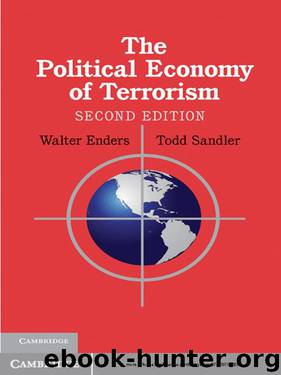The Political Economy of Terrorism by Walter Enders

Author:Walter Enders [Enders, Walter]
Language: eng
Format: epub
ISBN: 9781139184601
Publisher: Cambridge University Press
Published: 2012-04-24T05:00:00+00:00
Table 6.2. Global and Regional Conventions and Treaties Relating to Controlling International Terrorism
Sources: United Nations (2002b, pp. 17–18; 2003; 2009; 2010).
To date, there are thirteen international conventions and nine regional ones that forbid a wide range of terrorist activities, from bombings to hostage taking. International conventions prohibit actions against diplomatic missions, aircrafts, ocean platforms, nuclear power plants, and ships. A 1998 convention makes terrorism more difficult by tagging plastic explosives in order to identify perpetrators, and another convention seeks to suppress terrorist financing. The most recent UN international convention banned acts of nuclear terrorism; this convention went into force within months of its initial framing. In contrast to their international counterparts, regional conventions outlaw all forms of terrorism that meet the convention-approved definition. Some regional conventions took time for ratification as parties argued over the definition of terrorism.
These conventions have been reactive, responding only after a spate of attacks. For example, the adoption of the International Civil Aviation Organization (ICAO) conventions followed numerous hijackings and bombings of commercial airlines in the 1960s. The UN convention outlawing crimes against diplomats and other protected persons was approved only after many such attacks in the late 1960s and the beginning of the 1970s. The recent antinuclear terrorism convention was ratified after evidence, gathered from the US-led invasion of Afghanistan in 2001, indicated al-Qaida’s efforts to acquire nuclear weapons. The presence of terrorist groups in India and Pakistan, which might someday possess nuclear weapons, makes the world understandably concerned. All conventions rely on the ratifying countries to implement the stipulated prohibition or institute the required action using their own laws and resources. Essentially, conventions are a means of bolstering antiterrorist policy by coordinating national action through set guidelines. Varying levels of adherence are consequently anticipated, especially since none of these conventions possesses an enforcement mechanism and nations have different counterterrorism capacities, resources, and interests. Conventions involving a weakest-link public good are particularly problematic because success may be compromised by inadequate response by nonratifiers or by ratifiers with limited capacity. Terrorists will take advantage of such vulnerabilities. For example, plastic explosives may not be traced following a bombing if terrorists acquire them in a country where the convention is not effectively implemented. For many international conventions, a single compliance failure can severely jeopardize the safety of all potential targets in a globalized world. Such noncompliance greatly limits the usefulness of the convention. For some conventions, universal ratification and implementation are necessary, but never attained.
To investigate the effectiveness of some of these international conventions, Enders, Sandler, and Cauley (1990a) applied intervention analysis to various terrorist events. In the case of crimes against diplomats and other protected persons, they compared the pre-convention mean of the series for such attacks with its post-convention mean and uncovered no significant differences, suggesting that this convention was ineffective. For skyjackings, these authors performed the same test for the UN Security Council resolution of 1985 and earlier antihijacking resolutions and conventions (for example, the Hague Convention on seizure of aircraft and the
Download
This site does not store any files on its server. We only index and link to content provided by other sites. Please contact the content providers to delete copyright contents if any and email us, we'll remove relevant links or contents immediately.
International Integration of the Brazilian Economy by Elias C. Grivoyannis(106928)
The Radium Girls by Kate Moore(12003)
Turbulence by E. J. Noyes(8002)
Nudge - Improving Decisions about Health, Wealth, and Happiness by Thaler Sunstein(7678)
The Black Swan by Nassim Nicholas Taleb(7086)
Rich Dad Poor Dad by Robert T. Kiyosaki(6576)
Pioneering Portfolio Management by David F. Swensen(6270)
Man-made Catastrophes and Risk Information Concealment by Dmitry Chernov & Didier Sornette(5981)
Zero to One by Peter Thiel(5767)
Secrecy World by Jake Bernstein(4727)
Millionaire: The Philanderer, Gambler, and Duelist Who Invented Modern Finance by Janet Gleeson(4447)
The Age of Surveillance Capitalism by Shoshana Zuboff(4267)
Skin in the Game by Nassim Nicholas Taleb(4223)
The Money Culture by Michael Lewis(4174)
Bullshit Jobs by David Graeber(4161)
Skin in the Game: Hidden Asymmetries in Daily Life by Nassim Nicholas Taleb(3973)
The Dhandho Investor by Mohnish Pabrai(3741)
The Wisdom of Finance by Mihir Desai(3720)
Blockchain Basics by Daniel Drescher(3564)
